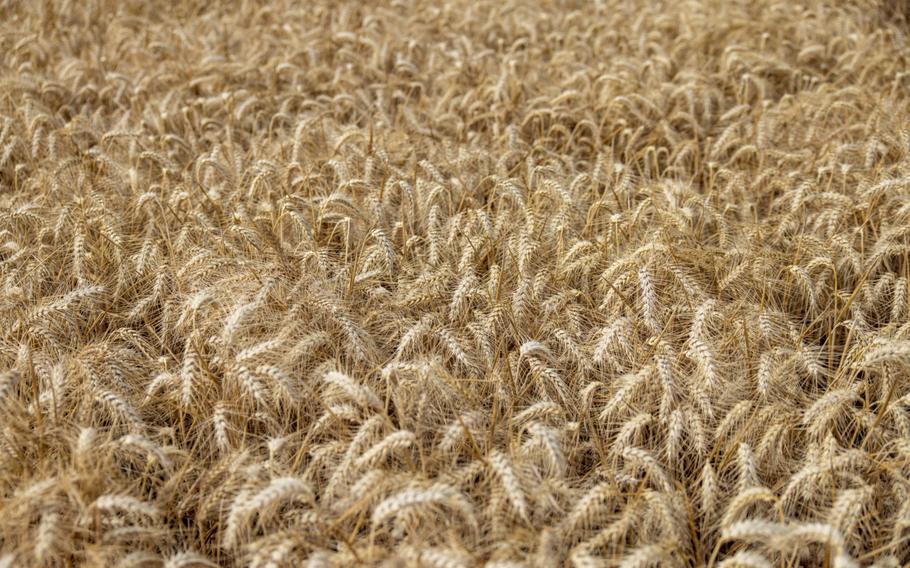
Class one milling wheat ready for harvest in Chelmsford, UK, on Wednesday, Aug. 3, 2022. Droughts, flooding and heat waves threaten wheat output from the U.S. to France and India, compounding shrinking production in Ukraine. (Hollie Adams/Bloomberg)
Wheat futures pared some of their recent gains as it emerged that Russia has failed to severely damage a key port that is allowing Ukraine to export grains by river into neighboring countries.
Russian drones attacked the port of Reni in the night leading to Monday, driving up grain prices as it threatened to choke off Ukraine's last major hope of getting its crops to buyers. But Reni was operating at maximum capacity on Tuesday, with seven ships due to enter, according to Romanian official Gabriel Covrig, who is responsible for ship piloting in the area.
Chicago futures, the most traded global benchmark, retreated by as much as 2.2%. On Monday, they jumped by 8.6% as traders tried to figure out the repercussions of damage to the river port. Shipments by river have become the last major route for grain to leave Ukraine after Russia exited a deal allowing passage through the Black Sea last week.
Ukrainian exports have historically made an important contribution to global food supply, and escalations in the war have triggered price volatility throughout the conflict. While the world still has a large buffer of wheat stockpiles, the latest events highlight the vulnerability of global food security since the start of Russia's invasion, and as climate change wreaks havoc on certain crops.
"Russia's bombing of port infrastructure along the Danube river in Ukraine has pushed grain prices significantly higher," according to ING analysts Warren Patterson and Ewa Manthey. "This escalation risks spilling over into other parts of the commodities complex, particularly energy."
At least four grain hangars were damaged or ruined by Russian drone strikes, according to Ukrainian prosecutors who launched an investigation into the attack. Reni, along with the port at Izmail, is one of Ukraine's biggest river ports for grain and is located on the Danube at the border with Romania. Local traders had been expanding capacity there in response to Russia's sea blockade.
Still, the strikes will make ship owners and crew more wary of calling at the river ports. "The ports can operate, but the problem is that some crews are not willing to go there for the time being," Constanta-based grain broker Andrei Balasoiu said. He owns barges that sometimes call at Reni. "Some are willing to go, but most are afraid of getting hit by missiles"
The risk to the Danube route has left traders assessing the viability of remaining Ukraine grain export routes. Shipments by land have caused tensions with its Eastern European neighbors. Five countries including Poland and Romania are seeking to extend a ban on purchasing Ukrainian grain after declining prices spurred protests from local farmers. Grain can still transit through those countries.
Lithuania's agricultural minister wrote to the E.U. on July 21 to suggest that Baltic ports be used as an alternative route for transit of Ukraine's agricultural exports, according to a document seen by Bloomberg. While Baltic railways and ports have an annual capacity of 25 million tons, it's unclear how realistic this option is and how quickly this could help boost exports, given the need to switch tracks to a different gauge at the border and insufficient rail cars.
"We proposed to the Polish side an action plan to ensure that the grain will not stay in Poland, and to encourage a tracking system. We hope to have solidarity from the Polish side," Lithuanian agricultural minister Kestutis Navickas said on Tuesday.
Kremlin spokesman Dmitry Peskov said the Baltic countries have the right to ship Ukrainian grain but Russia will fight any attempts to use the channels for any military purposes, according to Interfax.
Bloomberg's Piotr Skolimowski, Irina Vilcu, Sofia Gerace and Daryna Krasnolutska.